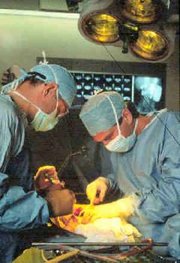Surgery
|
|
Template:Dablink Surgery (from the Greek cheirourgia - lit. "hand work") is the medical specialty that treats diseases or injuries by operative manual and instrumental treatment. Surgeons are medical practitioners who specialize in surgery.
A surgery can also refer to the place where surgery is performed, or simply the office of a physician, dentist, or veterinarian.
| Contents |
History of surgery
The history of surgery dates back to at least the 3rd millennium BC in Ancient Egypt. Researchers have also uncovered a mandible, dated to approximately 2750 BC, having two perforations just below the root of the first molar, indicating the draining of an abscessed tooth. Recent excavations of the construction workers of the Egyptian pyramids also led to the discovery of evidence of brain surgery on a labourer, who continued living for two years afterwards.
The Edwin Smith papyrus is the oldest known surgical text, dating back to the 1600s BC, although it contains information dating back to 3000 BC. It is an ancient Egyptian textbook on surgery, and describes in exquisite detail the examination, diagnosis, treatment, and prognosis of numerous ailments.
Trepanation, also known as trephinning or trepanning, is an ancient form of surgery where a hole is drilled or scraped into the skull, leaving the membrane around the brain intact. It attempts to address health problems that relate to abnormal intracranial pressure, and has been found in cultures around the world. Modern surgery has been largely abandoned this practice, however.
Although surgeons are now considered to be specialised physicians, the profession of surgeon and that of physician have different historical roots. For example, the Hippocratic Oath warns physicians against practicing surgery (in particular to relieve kidney stones), which was to be left to specialized craftsmen.
Among the first modern surgeons were battlefield doctors in the Napoleonic Wars who were primarily concerned with amputation. Naval surgeons were often barber-surgeons, who combined surgery with their main jobs as barbers.
In London, an operating theatre or emergency room from the day before modern anaesthesia or antiseptic surgery still exists, and is open to the public. It is found in the roof space of St Thomas Church, Southwark, London and is called the Old Operating Theatre.
Development of modern surgery
In the UK and some other places, male surgeons are distinguished from physicians by being referred to as "Mister." This tradition has its origins in the 18th century, when surgeons were barber-surgeons and did not have a degree (or indeed any formal qualification), unlike physicians, who were doctors with a university medical degree.
By the beginning of the 19th century, surgeons had obtained high status, and in 1800, the Royal College of Surgeons (RCS) in London began to offer surgeons a formal status via RCS membership. The title Mister became a badge of honour, and today only surgeons who hold the Membership or Fellowship of one of the Royal Colleges of Surgery are entitled to call themselves Mister, Miss, Mrs or Ms.
In contrast, American physicians and surgeons are always addressed as "Doctor."
Common surgical procedures
Of the eight most common surgical procedures in the US, four are obstetric:
- episiotomy,
- repair of obstetric laceration,
- cesarean section, and
- artificial rupture of the amniotic membrane.
According to 1996 data from the US National Center for Health Statistics, 40.3 million inpatient surgical procedures were performed in the United States in 1996, followed closely by 31.5 million outpatient surgeries.
Noted surgeons
- For a more complete list, see List of surgeons.
- Christiaan Barnard (cardiac surgery, first heart transplantation)
- Walter Freeman (lobotomy)
- Sir Victor Horsley (neurosurgery)
- Lars Leksell (neurosurgery, inventor of radiosurgery)
- Joseph Lister (discoverer of surgical sepsis, Listerine named in his honour)
See also
- medicine, biomaterial
- General Surgery, plastic surgery, Abdominal surgery, Laparoscopic surgery, Traumatology, Sexual reassignment surgery, dental surgery, eye surgery
- List of surgical procedures
- FACS
- Remote surgery
External links
- History of Dentistry (http://www.idakerala.org/dentistryhome.asp#a1b)
- Interview with Dr. Zahi Hawass, Director of the Pyramids (http://www.pbs.org/wgbh/nova/pyramid/excavation/hawass.html)
- WikiMed (http://www.wikiservice.at/wikimed/wiki.cgi?Chirurgie), a wiki with substatial information about surgery (in German)
| Health science - Medicine |
| Anesthesiology - Dermatology - Emergency Medicine - General practice - Intensive care medicine - Internal medicine - Neurology - Obstetrics & Gynecology - Pediatrics - Podiatry - Public Health & Occupational Medicine - Psychiatry - Radiology - Surgery |
| Branches of Internal medicine |
| Cardiology - Endocrinology - Gastroenterology - Hematology - Infectious diseases - Nephrology - Oncology - Pulmonology - Rheumatology |
| Branches of Surgery |
| General surgery - Cardiothoracic surgery - Neurosurgery - Ophthalmology - Orthopedic surgery - Otolaryngology (ENT) - Pediatric surgery - Plastic surgery - Podiatric surgery - Urology - Vascular surgery |
es:Cirugía fr:Chirurgie ga:Máinliacht lt:Chirurgija nl:Heelkunde ja:外科学 nds:Kirurgie pl:Chirurgia pt:Cirurgia sv:Kirurgi zh:外科学

